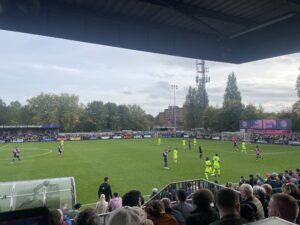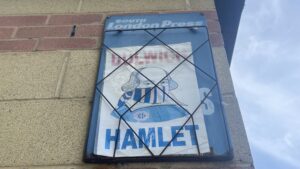Dulwich Hamlet: The football club trying to move on from a manager of 13 years
The Sports Gazette made the trip to Champion Hill to see how Dulwich Hamlet Football Club are adjusting to life after the end of Gavin Rose’s 13-year spell as manager.

It is often said that the era of football managers remaining in situ at the same club for a decade or more ended with the retirement of Sir Alex Ferguson in 2013 or the parting of ways between Arsène Wenger and Arsenal five years later.
With on-field results prioritised above all else at practically every level of the game, managers now seem to bring with them bespoke ‘cycles’ that mean their date of departure is decided from the moment they take the job.
Dulwich Hamlet of the National League South often felt like an exception to this rule. After appointing Gavin Rose as manager in August 2009, he remained in charge for over 13 years, overseeing promotion glory, play-off heartbreak and even the club’s battle for its very existence.
It therefore came as a surprise when it was decided at the start of September that Rose would not have his contract renewed and would be leaving his post immediately after a slow start to the current season.
“It was very difficult,” says Dulwich chairman Ben Clasper as he reflects upon the decision. “People forget about Dulwich; they forget where we came from. You’re talking about a manager who has brought a club up to a level it has never played at in its 130-year history.
“Obviously it’s really hard. Our loyalty to Gavin meant that we didn’t plan it (changing manager).
“When someone has been in post for so long, you don’t realise that maybe you are running things in a way that you shouldn’t be. You just run things in the way that you’ve always run them.”
Even though Clasper is currently the figurehead among a board of directors, Dulwich Hamlet is an institution that firmly belongs to its supporters.
Following years of financial mismanagement under previous custodian Nick McCormack, the team were temporarily left without a home at the end of their 2017/18 Isthmian Premier Division promotion season and the fans very nearly lost their club altogether.
Supporter donations fended off oblivion, but it was decided more needed to be done to secure a sustainable future in the National League South. In the summer of 2018, the Dulwich Hamlet Supporters’ Trust purchased a 27.3% stake in the club.
“Because of the way that we are run, it’s not a personal decision,” says Clasper in relation to the parting of ways with Rose. “The response we got was that it was sad that it had to happen. The legacy (of Rose) is huge, but, the fans, almost to a person, thought that it was the right time.”
Home ground Champion Hill is the sort of non-league abode where the tactical advice of seasoned veterans in the stands is complimented by pale ale drinking on the terraces. Where a commitment to kicking junk food out of football is prioritised over profiting from fans. Where the winners of a poetry competition at a local school are treated with greater reverence than other clubs greet visiting dignitaries.
Mishi Morath Poetry!
On Saturday, we were delighted to have the winning poets from the inaugural Morath Poetry Competition run by Mishi’s family and @StAnthonysSE22 (Mishi’s Primary School).
A truly wonderful way to remember a legend of #DHFC pic.twitter.com/jfgYge1kk4
— Dulwich Hamlet FC Community (@DHFC_Community) October 24, 2022
Described by Clasper as ‘The Rabble’, newly appointed permanent manager Paul Barnes became more than familiar with the nature of the Champion Hill crowd in a month-long spell as interim boss.
“It’s the reason why anyone would want to come and be associated with the club,” he says. “There are so many good people around helping. It’s not just about what happens at 3 o’clock on a Saturday afternoon, there’s people working here all hours, impacting the community.
“Who wouldn’t want to be involved in a club like this?”
Barnes’ time as interim manager saw Dulwich collect three wins from six games, but his new chairman was simply grateful to have someone in place to steady the ship.
“The change left us unprepared if we’re honest,” admits Clasper. “He [Rose] left; the coaching staff left. Players had to step in for a game to manage the team which was really hard.
“Did we get it right by not having a plan in place? I think we did, because I know I can look everyone in the eye and say I didn’t have a single conversation behind anyone’s back. It has meant that the process afterwards has been tougher because it’s taken us longer.”
Barnes confessed that he did not expect to be the board’s first-choice candidate to take over, regardless of his success as temporary boss, but feels he could be the ideal man to continue the work of Rose.
“I’ve said from the outset that my values and principles are in line with what the club is about,” he explains as the crowd filter out following a 2-1 win against Hungerford in his first game in permanent charge. “Anybody else coming in… I don’t know if they would have understood the culture of the club and the tradition in terms of what Gav put in place here.
“I think if he could pick someone to carry on the great work that he’s done here, I’d like to think that he would pick someone like myself.”

Dulwich are now three points clear of the relegation zone ahead of a run of six games in 18 days as the National League South becomes ever more hectic with the festive period approaching.
Even though the club currently sit 19th in the league standings, Clasper retains belief that the positive start under Barnes can lead to a surge up the table.
“I still talk about play-offs,” he says, huddled at the back of the main stand as an autumnal breeze sweeps leaves across the Champion Hill pitch.
“We came out of the interim period with a 50 percent win rate. To get into the play-offs you have to be winning 50 percent of your games.”
Yet, regardless of on-field success, the Dulwich chairman seems content that the feeling around the club is a positive one once more.
“The supporters now have a belief,” he says, “we have a belief, I know Barnsey has got a belief, so hopefully the players will now get that as well.”